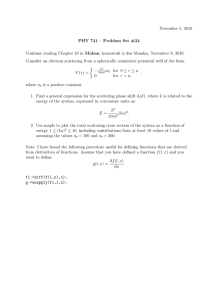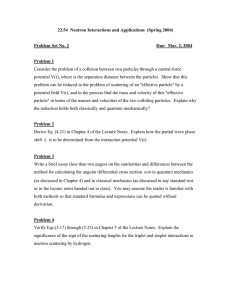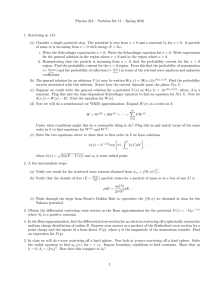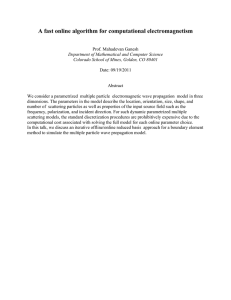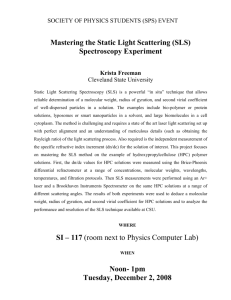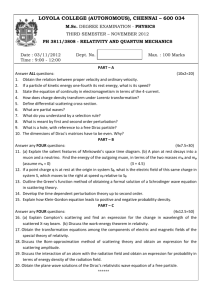Goniometer specification
advertisement
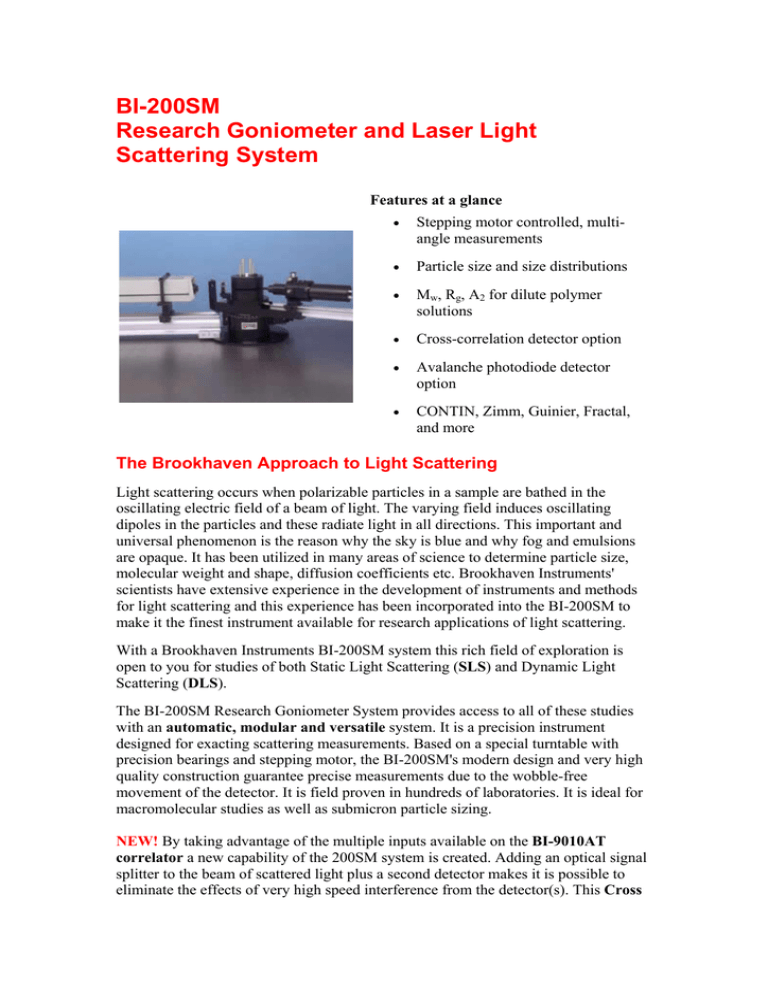
BI-200SM Research Goniometer and Laser Light Scattering System Features at a glance • Stepping motor controlled, multiangle measurements • Particle size and size distributions • Mw, Rg, A2 for dilute polymer solutions • Cross-correlation detector option • Avalanche photodiode detector option • CONTIN, Zimm, Guinier, Fractal, and more The Brookhaven Approach to Light Scattering Light scattering occurs when polarizable particles in a sample are bathed in the oscillating electric field of a beam of light. The varying field induces oscillating dipoles in the particles and these radiate light in all directions. This important and universal phenomenon is the reason why the sky is blue and why fog and emulsions are opaque. It has been utilized in many areas of science to determine particle size, molecular weight and shape, diffusion coefficients etc. Brookhaven Instruments' scientists have extensive experience in the development of instruments and methods for light scattering and this experience has been incorporated into the BI-200SM to make it the finest instrument available for research applications of light scattering. With a Brookhaven Instruments BI-200SM system this rich field of exploration is open to you for studies of both Static Light Scattering (SLS) and Dynamic Light Scattering (DLS). The BI-200SM Research Goniometer System provides access to all of these studies with an automatic, modular and versatile system. It is a precision instrument designed for exacting scattering measurements. Based on a special turntable with precision bearings and stepping motor, the BI-200SM's modern design and very high quality construction guarantee precise measurements due to the wobble-free movement of the detector. It is field proven in hundreds of laboratories. It is ideal for macromolecular studies as well as submicron particle sizing. NEW! By taking advantage of the multiple inputs available on the BI-9010AT correlator a new capability of the 200SM system is created. Adding an optical signal splitter to the beam of scattered light plus a second detector makes it is possible to eliminate the effects of very high speed interference from the detector(s). This Cross Correlation System provides remarkably clean data as has been illustrated in published papers. The BI-CrossCorr with two photomultiplier detectors is available as an option on all BI-200SM goniometers; an APD version is expected to be available in the near future. The BI-200SM's modularity simplifies system expansion. Featuring a standard optical rail, the BI-200SM can be used with neutral density filters, a polarizer, an analyzer, and a reference detector. Special sample requirements can often be met by changing the cell holder design or size. Special Features of the BI-200SM Research Goniometer System Both DLS and SLS modes: Correlation & Intensity Measurements Large angular Range: 8° to 155° with 25mm cells: 15° to 155° with 12mm cells. Fine Adjustment Control: Read angle to 0.01° directly on large, fine-control adjustment knob. Open Design/Standard Optical Rails: Facilitates user customizations for special purposes. Temperature Control: Heating and cooling via any standard external circulator Separate temperature and filtration plumbing. Special Design Glass Vats: Specially polished and optically flat entrance window ensures minimum flare. Alignment Cell: Fine-screw vertical adjustment for ease and accuracy of setting the centre of rotation. Multiple Laser Line Filters: Filter wheel with 632.8 (HeNe), 514.5/488.0 nm (Ar+), one open position and 2 blank (shutter) positions. Also available with 532 nm bandpass filter. Enhanced Viewing Optics: Coated, precision achromats coupled with behind-the-slit viewing and high-quality eyepiece facilitate alignment procedures. Additional Alignment Aperture: Alignment of laser much simpler and faster. Variety of Cell Holders: High precision cell holders standard, low-priced round cells available: 27.5 mm dilution vials fit cell holder sleeve. Special small-volume cell available. Typical Applications In the SLS mode, time-averaged intensity measurements are made - at either fixed or variable angles - in the range from 8° to 155° and analyzed with software provided for the methods of Zimm, Berry, Debye, Guinier, Kratky etc. Such evaluations using measured angular or concentration dependencies of the intensity of the scattered light provide key information in such topics as: ! Mw - Molecular weight determinations ! Rg - Radius of gyration ! A2 - Determination of second virial coefficient ! Micro-emulsion technology ! Colloid behaviour ! Complex fluid characterization ! Emulsion polymerization ! Particle growth ! Nucleation processes The field of DLS measurements is at least as rich as that of SLS . In this method the dynamics of the scattered light are determined and analyzed. The short-term intensity fluctuations (dynamics) of the scattered light arise from the fact that the scattering particles are undergoing rapid thermal motions known as Brownian motion. Various terms have been used for this technique including Dynamic Light Scattering (DLS), Photon Correlation Spectroscopy (PCS) and Quasi-elastic Light Scattering (QELS). To uncover the key parameters which describe the diffusive motions, a digital autocorrelator is used to determine the autocorrelation function (ACF). Using DLS measurements, many interesting subjects may be explored, among them: ! Particle size distributions ! Particle aggregation phenomena ! Micellar systems ! Micro-emulsion technology ! Colloid behaviour ! Vesicles & liposomes ! Plasmid DNA's ! Particle growth ! Nucleation processes & protein crystallization Specifications Beam Focus and Steering: Includes mounts, adjustments, and apertures. Turntable: 200 mm O.D. turntable, worm gear and ball bearings; manual or automatic selection of angles in 0.01° steps; precision machined base with mounting holes; positioning table with micrometer adjustments. Sample Cell Assembly: Including thermal enclosure, centring adjustments, separate plumbing for temperature control and index matching liquids, round cell holders, square cell holder and alignment cell. Index Matching Vat: With optically flat and specially polished entrance window; precision machined and annealed to minimize stray light. Periscopic Beam Stop: Located inside vat to prevent flare from exit window; provided with coupling for use with optional, zero-angle reference detector. Main Detector Optics: Entrance aperture of 3 mm. Coated, adjustable achromat for focusing scattered light onto 200 micron slit. Slit position adjustable. Reflex mirror and high quality eyepiece for viewing scattering region through slit. Filter turret with 632.8, 514.5, 488.0 nm, 2 closed positions, and 1 open position. other filters available. Secondary pinhole turret: 100, 200 and 400 micron pinholes for DLS measurements; 1, 2 and 3 mm pinholes for SLS measurements. Options and Accessories BI-DNDC: Differential Refractometer for determining refractive index increment (dn/dc) for use in SLS measurements. BI-CrossCorr: Dual detector (PMT) system for cross correlation. BI-SFS: The BI-SFS sample filtration system provides a fast and convenient way to remove “dust” from light scattering samples, and is especially recommended when working with very small particles. BI-APD: Avalanche photodiode (higher sensitivity than PMT especially to longer wavelengths). BI-HV: High voltage power supply. BI-LRM: Laser rail and mounts. Available for most lasers. BI-TCD: Temperature controller, external circulator type, 0 to 100° C, digital setting and readout, ± 0.1° stability. BI-FC: Filtration/circulation system for index matching liquid. BI-RC12: Nominal 12 mm O.D. Round Glass Cell, polyethylene cap. BI-SCG: 10mm path length Glass Square Cell & PTFE cap. BI-RC25: Nominal 25 mm O.D. Round Quartz Cell, dual Teflon tops, mounting ring. BI-RC27: Nominal 27.5mm O.D. round glass cells, pack of 100 with screw caps. BI-SVC: Small-volume cell BI-2DS: Reference detector including mount. BI-PA: Polarization Analyzer, Glan-Thompson prism, 5x10-6 extinction, 2-position mount. Legend 1. Laser rail and mounts, optional 2. Precision-machined base 3. Turntable 4. Rigid rotating arm 5. Upright for 2 mm alignment aperture 6. Detector rail 7A,B. Center of rotation adjustment screws 7C. Center of rotation locking screw 8. Center of rotation adjustment table 9. Beam focusing and steering lens assembly 10. Sample cell assembly 11. Beam Stop 12A. Lens adjustment, horizontal 12B. Lens adjustment, vertical 13A. Slit adjustment, horizontal 13B. Slit adjustment, vertical 14. Mirror adjustment 15. Eyepiece 16. Pinhole wheel 17. Filter wheel 18. Detector housing 19. Angle adjustment 20. Clutch release 21. Support ring brookhaven INSTRUMENTS LIMITED Chapel House, Stock Wood, Worcestershire B96 6ST, UK Tel : +44 (0)1386 792727 Fax : +44 (0)1386 792720 www.brookhaven.co.uk
